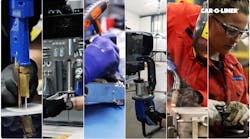Use of these recycled parts, a $22-billion industry, has been widely accepted for decades and there is a long track record of their successful use, ARA said. Recycled parts are original equipment manufacturer (OEM) parts. They are fully functional and are in many cases identical to the original parts Hyundai Motor America and American Honda are requiring, according to ARA. Recycled parts were new OEM parts at some point, yet both Hyundai Motor America and American Honda are calling for the use of their own new parts in repairs.
“Neither manufacturer has provided any evidence that parts unaffected by an accident become inadequate once reused, which begs the question why their use is not supported by either company,” ARA’s Chief Executive Officer Michael E. Wilson states in his appeal to the FTC. “Following the logic held by these companies, as soon as a new Hyundai, Honda or Acura drives off the lot, its parts are unsuitable for use as replacement parts in another vehicle, implying that the parts are unfit for use as soon as the car drives off the lot.”In addition, recycled parts have several additional benefits compared to new parts:
- Recycled parts allow consumers to save on costs
while using parts identical to new OEM parts.
- Recycled parts are better for the environment,
since no additional resources or energy were used to create
an unnecessary new replacement part.
- Auto recyclers provide warranties on any recycled part used in a repair, indicating that recycled parts are not used in an attempt to cut corners with customers.
According to the most recent Mitchell Repair Collision Data, new OEM parts accounted for 67.9% of all parts used in repairs, which represented a decline from previous quarters. In the second quarter of 2008, new OEM parts accounted for 74.4% of all parts used in repairs. Much of this decline can be explained by consumers and the collision repair industry becoming better educated about quality part alternatives, such as recycled OEM parts. As automobile manufacturers watch their large market shares shrink from legitimate competition, they become concerned about loss of profit.
"We believe that many, if not most manufacturers are attempting to maintain their market power through inappropriate restrictive activities including issuing statements that their warranties will not cover the use of recycled parts,” said Wilson.
Established in 1943, the Automotive Recyclers Association (“ARA”) represents an industry dedicated to the efficient removal and reuse of “green” automotive parts, and the proper recycling of inoperable motor vehicles. ARA represents over 4,500 auto recycling facilities in the United States and fourteen other countries around the world. With programs such as the Certified Automotive Recycler Program (CAR) and other partnerships.
For more information visit www.a-r-a.org.

